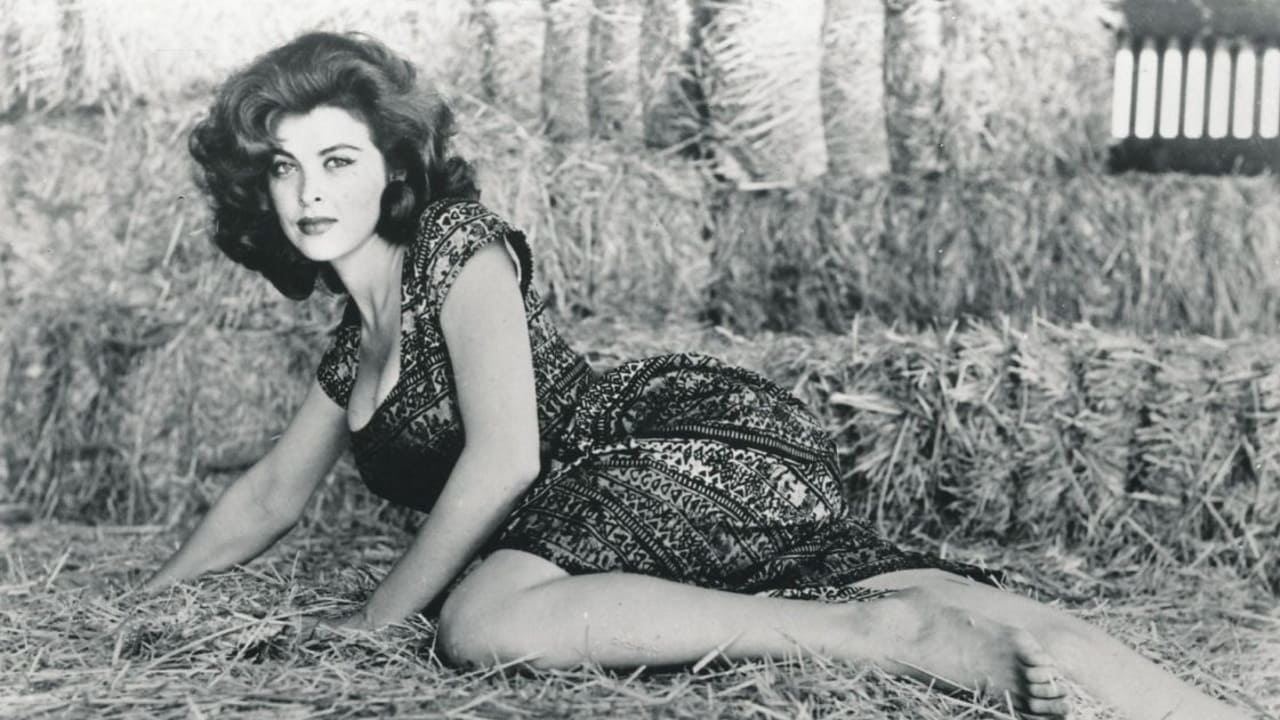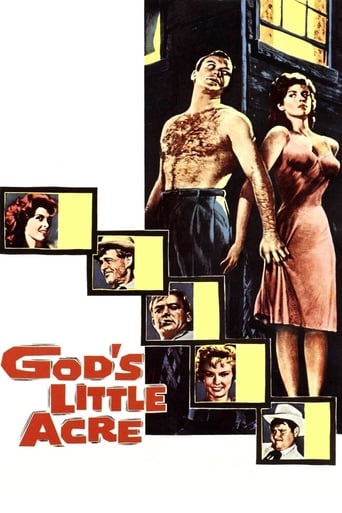Greenes
Please don't spend money on this.
HottWwjdIam
There is just so much movie here. For some it may be too much. But in the same secretly sarcastic way most telemarketers say the phrase, the title of this one is particularly apt.
Michelle Ridley
The movie is wonderful and true, an act of love in all its contradictions and complexity
Phillipa
Strong acting helps the film overcome an uncertain premise and create characters that hold our attention absolutely.
ferbs54
My third Robert Ryan movie of the week was the 1958 cult classic "God's Little Acre." This film was based on an Erskine Caldwell novel of some 25 years earlier, a novel that was deemed controversially racy for its time, and the film itself must have been seen as a pretty sexy outing for its day. In it, Georgia farmer Ty Ty (Ryan) obsessively searches for gold on his land by digging deep holes all over his property. His two sons, played by Jack Lord and Vic Morrow, assist, while his daughter Darlin' Jill (Fay Spain) and daughter-in-law Griselda (Tina Louise, in her first film) act bored and randy in the background. Would-be sheriff Pluto Swint (Buddy Hackett) comes by to court Jill, while in another town, daughter Rosamund (Helen Westcott) has problems with her drunken husband (Aldo Ray), who only wants to turn on the lights of the closed-down cotton mill again. The farmhand played by Rex Ingram induces Ty Ty to hire himself an albino to divine the presence of gold on the land, and that albino (Michael Landon!) is found and does the job. Or does he? Anyway, all these various plot elements come together very nicely, and many moments of amusing humor and great drama are to be had here, not to mention those racy elements. If you thought Tina Louise was nice looking on "Gilligan's Island," you've got to get a load of her in this one! Let's just say that her sweaty cleavage is prominently highlighted throughout, and leave it at that. All the performers in that most impressive cast give wonderful performances, and director Anthony Mann (who apparently DID do more than create classic Westerns in the '50s!) helms in a masterful manner, abetted by the great Elmer Bernstein's score. In all, a surprisingly winning entertainment that--if not as daring today as it must have seemed back when--holds up very well for a modern audience. More than highly recommended!
audiemurph
"God's Little Acre" surprisingly defied the expectations I had after seeing the credits. I expected Robert Ryan to be corrupt and lascivious, but he instead plays the most optimistic and happy character of his career - even if he is not the brightest bulb on the tree. Actually, he is the brightest bulb on the tree - not one character (other, perhaps, than the black sharecropper played by Rex Ingram) has much brains at all. And Buddy Hackett was not the complete comic foil of the film either: he is one of the love interests, and, although ostensibly played for laughs, his love is a little too earnest for it to be a complete joke. Very interesting of Director Thomas Mann to let the actors mix it up a bit.And people always mention how Michael Landon once played the Teenage Werewolf: but this is definitely a weirder role, that of the confused and scorned albino.Anthony Mann had already made his incredible series of intense Westerns with Jimmy Stewart by this time, and so it is not surprising that "God's Little Acre"'s many tense scenes of lust and violence (and near violence) are handled so deftly and with such ease and skill by Mann.But much more interesting, I think, is Mann's decision to include in so many of his highly tense scenes other characters, who sit passively and quietly while the main protagonists battle for 5 or more minutes at a time. Watch Buddy Hackett and Fay Spain sit at a table barely moving while Tina Louise and Helen Westcott (as Rosamind) desperately try to keep a drunk Aldo Ray from going to the cotton mill to turn on the power; note Tina Louise sitting and staring, immobile, while Robert Ryan berates his spoiled rich son Jim Leslie (played by Lance Fuller) while begging him for money. The spectator-characters seem so weirdly detached in these scenes - or are they just being polite, emotionally withdrawing so as not to embarrass the speakers? Very interesting indeed.Yes, the weather in the movie is hot and steamy; and the two girls played by Fay Spain and Tina Louise are also hot and steamy; no doubt there must have been a lot of panting on the set of this film. Poor Tina can barely make it through the door with her oft-viewed bosom in the way. When did Hollywood decide to turn the South from a proud but defeated post-Confederate Lost-Cause Society into such a sleazy and seedy land full of lazy leering men and women (calling Tennessee Williams)? A great movie full of highly unusual dialogue and characters. Highly recommended.
G8R 8U2
This has to be one of the worst movies ever made. The overacting is constant, and the characters aren't the least bit realistic for the setting. I expect a certain amount of melodrama in the older pictures; but this one will make you shake your head. The whole story, at least as it's portrayed in the movie, is contrived and absurd. The accents aren't even remotely accurate, except of course where the actors don't even attempt to adopt a Southern accent; then they sound just like where they're from (Illinois, Pennsylvania, New York, etc.). The rest of the time the actors and actresses simply sound like they're trying to make a Western... here's a little hint: people from the South, particularly during this period, DO NOT sound like they're from Texas. All Southern accents are not the same. I'm not even going to get started on the feasibility of a man getting shot and killed simply for turning the power on at a small mill... suffice it to say it's simply too stupid a notion to go into at length.So, in summation, the story itself (at least in this medium) is complete and utter nonsense. The sets don't look the first thing like the real South. And the terrible acting is further amplified by the ridiculous dialogue in which half of the characters sound like they're cowboys, and the other half sound like they're either from the Midwest or the Bronx.I explored my thesaurus to come up with an adjective that properly describes just how bad this movie is; and I'm caught between dreadful and inane. Perhaps I should just say the premise of the film is inane, and the execution was truly dreadful.
Roger Burke
I saw this movie soon after it was released when I was seventeen. Recently, I caught it again on late night TV; now, over fifty years later, I still count this one as one of the most interesting collection of oddball characters ever put to film. And all wrapped up in a timeless story about human frailties, family values and impossible dreams.Without doubt, this is the film that launched Tina Louise's lacklustre career into a series of B-movies of the late fifties and early sixties, followed by seemingly endless appearances in mindless TV drama and sitcoms over the next thirty-five years. What a shame: because I think her debut film role as Griselda Walden set a new standard for the term 'sex appeal' – and once seen, never forgotten, especially her first appearance with sunlight behind her, outlining her entire body through her thin, cotton shift. So, see this film for Tina Louise in action, if for no other reason.Erskine Caldwell's whole story is definitely worth watching, however. Actually, there are a number of stories beginning with old man Ty Ty Walden (Robert Ryan) and his fifteen-year, frenetic search for his grandfather's gold, supposedly buried somewhere on his farm: with that underlying scenario, Caldwell satirically skewers the lust for wealth that trap too many of us in ephemeral dreams which blind us to the reality around us. Robert Ryan gives his all, in what I regard as one of his best roles.Interwoven with Ty Ty's quest, we see unfold the bodily lust that Will Thompson (Aldo Ray) has for Griselda, the wife to embittered and jealous Buck Walden (Jack Lord). When Will has the hots for Griselda on a feverish summer night, and they stand in darkness, fingers entwined, at the corner of the house, sweat steaming off their bodies, you see one of the finest pieces of bodily eroticism ever put to film – and an image that's still used today, as the above poster on this page shows.The lust for power is given its comic turn with Sheriff wannabe Pluto Swint (Buddy Hackett) trying to get votes from all and sundry. With a name like Pluto – on the edge of society physically, mentally and emotionally – how far can he get? Well, he's also pining for the hand in marriage of Ty Ty's other daughter, Darlin' Jill (Fay Spain). With Pluto, Darlin' Jill pulls off an open-air, erotic bathtub scene that must be seen for its bawdy humor and Freudian overtones. Not to be missed...Wrap all that around Will Thomspon's efforts to power up the bankrupt local cotton mill again, add Ty Ty's visit to his only financially-successful son (to ask for money), Jim Leslie (Lance Fuller), and you have a succession of vignettes that pretty much cover the whole gamut of what it means to be human. Watch for very young Michael Landon (as the albino) and Vic Morrow (as Shaw Walden). Happily, with such an interpersonal imbroglio to appreciate fully, the cast fully delivers. Some argue it's over the top; and so it is, because it's mostly social satire.One puzzlement: the mise-en-scene looks and feels Depression era, but the presence of mid-1950s autos belies that. One wonders if that was a deliberate ploy by the producer and director. The black-and-white photography is exquisite; the sound track is appropriate, given the social milieu of the times, but I could do without it.Overall, it's a classic film which, despite winning no awards, should still be seen by all film lovers.

